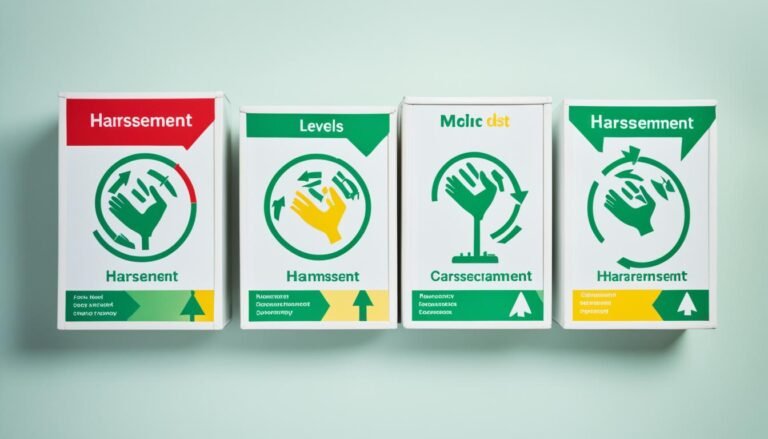Franchise Agreements: A Guide for Small Businesses
Did you know small business franchises contribute over $350 billion to the US economy yearly? Franchising offers quick brand recognition and success support. But, understanding franchise agreements is key for small business expansion.
Key Takeaways:
- Franchising can be a profitable way for small businesses to expand and thrive.
- Understanding franchise agreements and the legal requirements involved is essential.
- Consider factors like costs, franchisor controls, and contractual obligations before signing a franchise agreement.
- Thorough research and evaluation are necessary to find the right franchise opportunity.
- Professional legal advice is crucial to ensure compliance and protect your interests.
The Franchise Business Model
The franchise model is a great way for people to own a business. It lets investors, called franchisees, run a business that already has a proven system. This system was created by the franchisor.
One of the most popular sectors in franchising is the food franchise industry, which allows entrepreneurs to tap into a high-demand market with an established customer base.
Franchisees pay a fee to use the brand and the business model for some time, usually years. This gives them a brand name that customers already know. It helps bring in customers right away.
The big plus of franchising is the help franchisees get from the franchisor. They get advice on finding a location, training, how to operate, and marketing. This guidance is very important, especially for first-time business owners.
But, owning a franchise means following lots of rules and paying fees. These can be ongoing and may include a share of sales and money for ads. The franchisor also controls things like what products to sell and the look of the store. Franchisees follow these rules to keep everything the same across all stores.
This model blends being your own boss with a lot of support. This mix can help make businesses more likely to succeed. Still, everyone thinking about a franchise needs to look closely at the costs, rules, and agreements.
Franchisees: The Key Players in the Franchise Business Model
Franchisees are those who invest in a franchise and run it. They make sure the business follows all the rules and looks just right. Many franchisees are new to business and like having the franchisor’s help and a sure system to work with.
The Franchise Fee: Accessing the Franchisor’s Brand
The franchise fee is what the franchisee pays to get the brand, system, and help from the franchisor. It changes depending on the opportunity and is often a big investment. But, it gives the franchisee a well-known name to work with.
Franchisor Support: A Key Element of Success
Franchisors really help their franchisees. They train them, help them pick the right location, set up the business from the start, and give advice on how to run things. They also help with ads, which brings in customers. This help is to make sure all stores follow the brand’s ways and to help franchisees do well.
Is a Franchise Right for You?
Thinking about a franchise? First, see if it matches with your business dreams and skills. This means looking at the costs, how to get money, your skills, and what you aim for.
\To see if a franchise works for you, check your budget. Know how much you can invest and if you need more money. This way, you can focus on what’s affordable for you.
It’s key to think about your past work when looking at franchise chances. Are your skills a good match for what a franchise needs? If you’ve worked in the field or been a boss, you might do well.
Think about your personal goals too. Why do you want a franchise? Maybe for more money, a better job, or a new life. Also, know how much you want to earn and if you’re ready for hard work or to hire someone.
Being in a franchise is a longer deal. You’ll sign a contract that lasts a while. Make sure you’re okay with the franchise rules on some parts of your business.
Franchise Decision Checklist:
- Figure out how much you can invest.
- Match your skills with what the franchise needs.
- Know why you want a franchise and what you want to earn.
- Decide if you’re ready for hard work or want to hire someone.
- Check if you’re okay with the rules and support the franchise offers.
Thinking about these points can guide you to the right franchise choice. They help make sure you’re on track and boost your chances of doing well.
Finding the Right Opportunity
Looking for the perfect franchise goes beyond just checking websites. This part helps you find opportunities in different ways.
Conduct Market Research
To spot potential franchises, start by doing Franchise Market Research. Visit local franchise shops to see how they run and talk to owners. Getting first-hand info can show you what owning a franchise is really like. It also helps you see if the business matches your goals.
Utilize Franchise Handbooks
Franchise Handbooks are full of useful info for those looking at franchising. You can find them online or in libraries. They give detailed guides on different franchise types, trends, costs, and what challenges to expect. Using these guides can help you make better choices.
Attend Franchise Expositions
Franchise expos let you dive into the world of franchising. They put many options in one place for easy comparison. At Franchise Expositions, you can meet exhibitors, ask questions, and connect with industry pros. You can also chat with franchisors to learn about their support and success stories.
Consider Franchise Brokers
Franchise brokers are like personal matchmakers for franchising. They know a lot about the market and can help you choose based on what you want and need. Franchise Brokers guide you through the choices, pointing out the good and bad of each. Their help can make the search easier and more focused.
| Method | Benefits |
|---|---|
| Conduct Market Research | Firsthand insights, understanding the franchise’s day-to-day operations |
| Utilize Franchise Handbooks | Comprehensive guides, industry trends, cost analysis |
| Attend Franchise Expositions | Explore multiple franchises, connect with industry professionals |
| Consider Franchise Brokers | Expert guidance, personalized recommendations |
Use these different approaches to find the perfect match for your goals and budget. Great research is key to making a smart choice.
The Franchise Disclosure Document
Looking into a franchise needs serious thought. That’s why getting detailed info is key for future franchise owners. The Franchise Disclosure Document, or FDD, offers this info. It’s a must-have document filled with info about the franchise. This helps future owners decide with confidence.
The FDD is where you find all the important facts. It dives into the franchisor’s story, their expertise, and any legal history. This document also covers costs like the franchise fee, what you’ll pay for use of the name, and ad costs.
The FDD has a section on financial success too. This part shows past or expected earnings of the franchise. It’s a vital part for making your decision. But, be sure to compare this data with other franchise info and your own plans.
Before you sign, digging deep into the FDD is a big step. It helps you see all the risks and wins the franchise could bring. This ensures fairness for you, the future owner, by laying all cards on the table.
| Key Information in the Franchise Disclosure Document | Description |
|---|---|
| Franchisor Details | The background, experience, and litigation history of the franchisor. |
| Financial Obligations | The initial franchise fee, ongoing royalties, and advertising fees. |
| Financial Performance Representation | Data and projections regarding the financial performance of the franchise. |
| Franchisee Obligations | Details of the franchisee’s responsibilities and obligations under the franchise agreement. |
It’s key that franchisors keep their FDD updated each year. This way, those looking to own a franchise get the latest info. Also, obeying state and national franchise laws is a must for both franchise owners and future owners.
Going over the FDD is a smart step for those considering a franchise. It helps you understand the money side and what you’re agreeing to. Armed with this info, future owners can wisely choose their path to a successful partnership.
Evaluating Potential Earnings
Looking into how much you could earn from a franchise is crucial. This involves checking the financial details and assessing if it’s profitable. Analyzing these aspects helps you decide if the franchise matches your money aspirations. To evaluate earnings accurately, look at several factors:
1. Request Financial Projections
Ask the franchisor for financial projections before you commit. These projections show what the franchise might make in revenue and costs. Dive into numbers like sales amounts and profit margins. This helps figure out if the franchise can earn what you want.
2. Analyze Costs and Profitability
Look at all franchise costs, from the start-up fee to ongoing expenses. Knowing these costs is key to seeing how profitable the franchise could be. Compare these costs to the revenue projections. This comparison shows if the business makes financial sense.
3. Evaluate Franchisor’s Track Record and Success
Check out the franchisor’s history and success in the field. See how other franchisees are doing to get an idea of your future success. Learn about profitability levels and how happy they are. A strong franchisor can help you make more money.
4. Stay Updated on Industry Trends
Stay up to date on industry news and trends. This means knowing what customers want and who your competitors are. Keeping up with trends helps you spot growth opportunities. It also shows if the franchise has a chance for success over time.
5. Conduct a Comprehensive Cost Analysis
Doing a thorough cost analysis is vital. Look at all costs including products, tools, and marketing. This analysis helps check if the franchise’s expected earnings cover all costs. It’s smart to talk to financial experts for a deep dive into the numbers.
By fully checking potential earnings, you’ll make a smart franchise investment decision. But remember, success isn’t just about profit. Think about how well you fit, your love for the business, and if it matches your life plans. Spend time researching and thinking about the finances to ensure a successful journey.
Before You Sign the Franchise Agreement
Before you sign any franchise agreement, it’s critical to carefully look over the contract. Make sure it follows all the legal rules. Getting advice from a legal expert is a must to really understand the deal.
Important things to check are how you can end the contract, if you can renew, and any rules about how to run the business. Also, look out for any limits on where and how you can sell.
Make sure you know what you’re signing up for, including how long the contract lasts and what happens if you don’t follow the rules. Think about how it could affect you in the future, like if fees or rules can change.
Franchise Agreement Review
Reviewing the franchise agreement thoroughly is key for anyone looking to join a franchise. This way, you make sure you know exactly what you have to do. It helps you spot bad signs or parts that need more talk.
Focus on these main areas when going over the agreement:
- Franchise Legal Compliance: The agreement should follow all the laws. Make sure the company told you everything and that they are legit according to state and federal rules.
- Franchise Contract Obligations: You must know what the company expects of you, including how much money you’ll need, how to run the business, and what reports you must make. Think about if these match with your plans and what you can do.
- Franchise Termination: Look at how you or the company can end the deal. See what happens then, like if you could lose money or the business itself.
- Franchise Renewal: See how you can renew the agreement. Know the steps, when it’s possible, and if the fees or rules can change if you do.
With a good, detailed review of the agreement, you lower the risks. You also get a clear view of what’s expected and can decide if the franchise is right for you.
| Key Considerations | Questions to Ask |
|---|---|
| Legal Compliance | Does the franchise agreement comply with federal and state franchise laws? |
| Contract Obligations | What are the financial and operational commitments outlined in the agreement? |
| Termination | Under what circumstances can the franchisor or franchisee terminate the agreement? |
| Renewal | What are the terms and conditions for renewing the franchise agreement? |
Advantages and Disadvantages of Franchising
Franchising has many pros for small businesses wanting to grow. Firstly, it offers fast expansion by opening new franchise spots. This helps businesses reach more people in new markets quickly. Also, it means sharing financial risks with franchisees rather than bearing all costs alone.
Being part of a franchise also means better deals when buying from suppliers. A larger franchise has more sway, getting items and help cheaper. This helps franchisees make more profit and stand out in their markets.
Control and Costs
Yet, franchising isn’t all good. You’ll have less control over how each franchisee runs their location. For those who care deeply about quality, this can be a big issue.
Also, the money part can be tricky. Be sure to know all the costs upfront, like fees and ongoing expenses. Check everything to make sure the deal fits your budget and business plans.
Franchisee Success and Challenges
Franchising can give franchisees big wins but with some tough times too.
Success often comes to franchisees who stick to the business’s plan and work in a good area. They get help, training, and a known brand name, all boosting their chances.
But there are also hurdles. Meeting ongoing support needs and dealing with strict rules can be hard. Plus, keeping up with laws that affect franchises takes effort and time.
| Franchising Advantages | Franchising Challenges |
|---|---|
| Rapid expansion through new franchise locations | Reduced control over franchise locations |
| Shared financial responsibilities | Ongoing support obligations |
| Collective buying power | Potential legal complexities |
Licensing as an Alternative to Franchising
Is licensing a better path for your business than franchising? It’s a good question to ask. Licensing allows the use of trademarks and IP without the full business support that a franchise provides. This can work well for businesses focused on selling items rather than a whole business method.
When you license your brand or products, you give others the right to use your property for a fee. This helps generate money while letting others benefit from your brand’s popularity.
Take time to look at both franchising and licensing. Choose the one that best fits your business aims. Franchising gives a detailed support system and a known business method. Licensing offers flexibility and possible cost benefits. Think about how much you want to control your brand and your role in licensees’ operations. Review the financial gains under each model as well.
Ultimately, the decision between licensing and franchising should be based on your specific business needs, goals, and resources. Conduct thorough research, seek expert advice, and carefully weigh the pros and cons to make an informed choice.
Advantages of Licensing:
- Lower investment costs compared to franchising
- Flexibility and adaptability in licensing agreements
- Potential for broader market reach through licensing partnerships
- Access to additional revenue streams through licensing fees
Disadvantages of Licensing:
- Less control over how the licensee operates the business
- Reliance on the licensee’s performance and adherence to quality standards
- Less support and guidance compared to franchising
- Potential risk of diluting brand identity and reputation if not properly managed
It’s important to handle licensing agreements with care, as with franchises. Everyone involved should understand their rights and obligations clearly. Talk to legal experts in licensing to ensure you follow all laws and protect your IP.
By exploring your options and understanding your goals, you’ll know if licensing is a suitable choice for your business.
Conclusion
Franchising is a good way for small businesses to grow and become more successful. But, it’s crucial to fully understand the rules and challenges involved.
To succeed in franchising, you should carefully look at the business model. Consider your skills and what you want to achieve. This will help you make smart choices and improve your chances of success.
It’s also key to do your homework on different franchise options. And, reading and understanding franchise agreements is important.
If you’re not sure about something, getting help from a professional is a good idea. They can guide you through the legal parts and support you in following franchise laws.
By being thorough and taking the right steps, you can start your franchising journey. Doing so will help your small business grow.
FAQ
Q: What is the franchise business model?
A: The franchise model lets people, called franchisees, run a business using a proven system. They pay a fee to use the franchisor’s name for a set time. Franchisees get help from the franchisor with picking a location, training, and ongoing advice.
Q: How do I determine if franchising is right for my business?
A: First, look at your finances, experience, and what you want personally and professionally. Think about how much money you have to invest and if you need a loan. Check if you have the skills needed to manage a franchise. Also, figure out why you want a franchise, how much money you need to make, and how hard you’re willing to work.
Ask yourself if you’re in it for the long haul and if you’re okay with following the franchisor’s rules.
Q: How can I find the right franchise opportunity?
A: Don’t just look at websites. Visit franchise locations near you and talk to other franchise owners. You can also use handbooks and go to expos to learn about different franchises.
To help, work with franchise brokers. They can guide you in finding the right fit.
Q: What is the Franchise Disclosure Document (FDD) and why is it important?
A: The FDD gives potential franchisees all the details about the opportunity. It covers the franchisor, fees, costs, and how successful other franchises are. It’s crucial to read it all before signing anything.
Franchisors update the FDD yearly and must follow franchise laws.
Q: How can I evaluate the potential earnings of a franchise?
A: Get financial predictions from the franchisor. Think about the costs and potential earnings. Look at the franchisor’s reputation and how well their other franchises are doing.
Also, study the market trends. This will help make sure the franchise fits your financial goals.
Q: What should I consider before signing a franchise agreement?
A: Read the contract thoroughly. It should meet all legal standards. Always have a lawyer look over it to make sure you understand everything.
Pay attention to how you can end the agreement, renew, or any restrictions. Know what happens if you don’t follow the rules.
Q: What are the advantages and disadvantages of franchising?
A: Franchising is great for growth, saving money, and brand power. But, it means less control and sticking to the franchisor’s rules. Make sure to think about the good and the bad before deciding.
Q: Is licensing a viable alternative to franchising?
A: Licensing is another option. It lets you use a brand without all the support of franchising. It might be better for some businesses, especially if they’re focused on selling a specific product. Look at the pros and cons of each to find what’s best for you.







